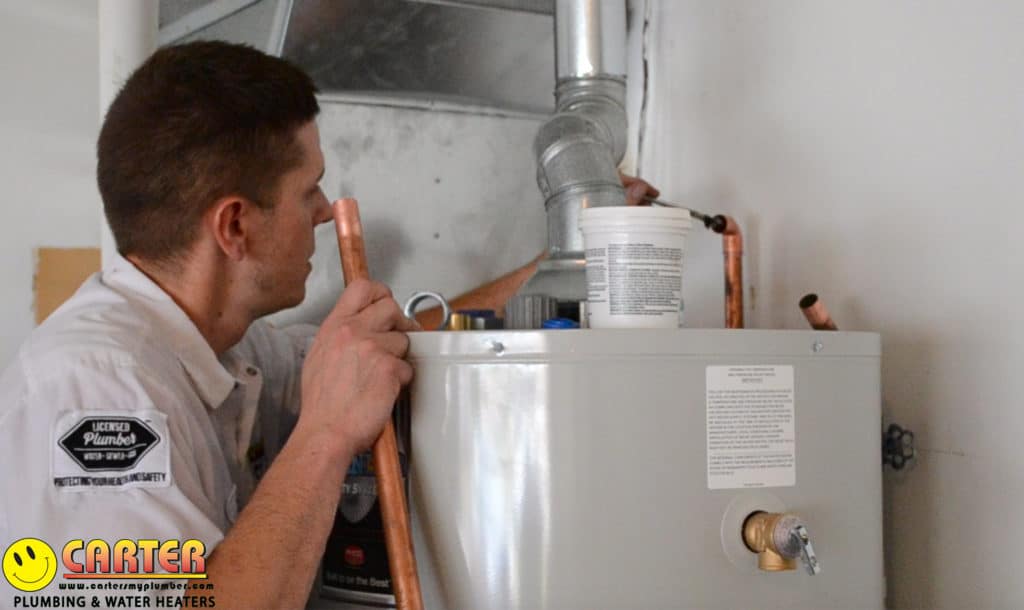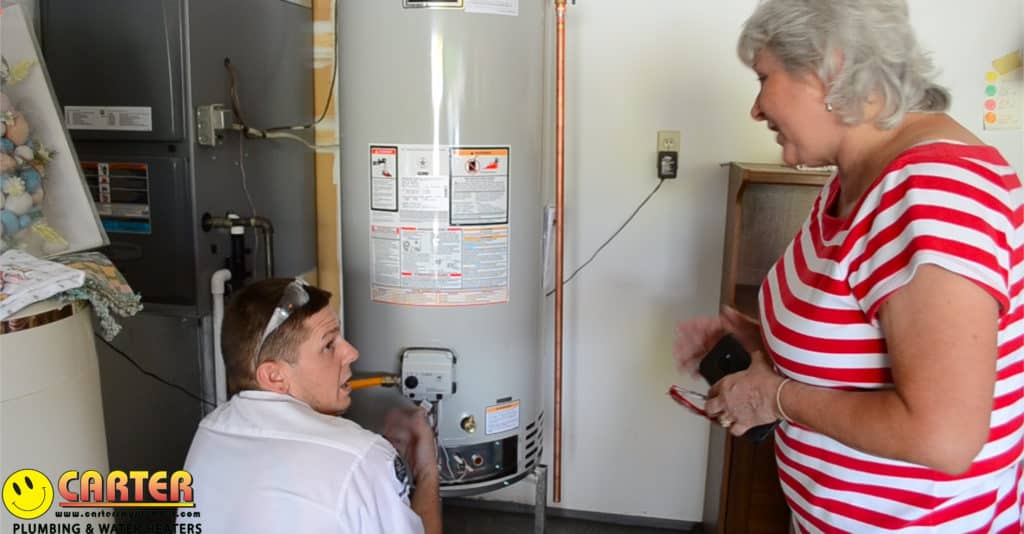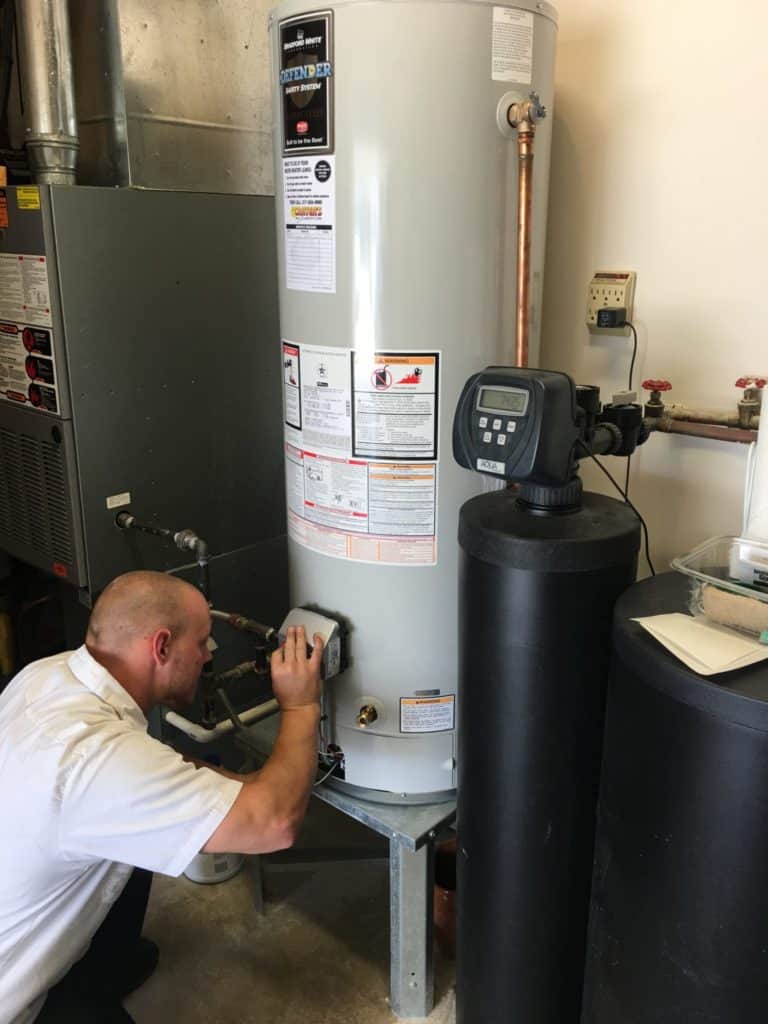Table of Contents

Most of us go from day to day without thinking too much about our hot water heater… that is, until the unit breaks down in some way. There are a number of ways in which a hot water heater might malfunction, but the most immediately obvious is when it springs a leak. If you pass by your water heater and notice that it’s got a pool of water around it, that’s a pretty good sign that it needs some plumbing TLC.
But what is the best way to fix a water heater that’s leaking? Is this something you can do yourself? Or, should you contact a professional plumber to help address your water heater leaking? In this post, we’ll offer our tips on repairing your unit in a way that puts your personal safety first, and also helps you determine how to remedy the leaking water heater as quickly as possible. If you decided you need professional help please visit our in-depth article hot water heater repair cost guide.
What Causes Water Heater Leaks?
To begin with, let’s cover some plumbing basics: What are some of the potential causes of a leaking water heater?
There are several factors that may explain why your water heater is leaking. Consider each of the following possibilities:
- There’s an issue with the drain valve. The drain valve is what allows water to leave the tank for maintenance, or for replacement. Additionally, homeowners can use the drain valve to rid the tank of any sediment that has built up. If that drain valve becomes loose, simply due to wear and tear, a little bit of water can escape. The good news is that this is usually pretty easy to fix; just get out a wrench, tighten the drain valve, and see if that solves the problem. If it doesn’t, it may be that the valve is no longer airtight, and just needs to be replaced. This is usually also a simple fix, but of course, a professional plumber can come and assist if needed.
- There’s too much pressure in your tank. The hot water in your tank creates steam, which in turn causes pressure to build up. Too much pressure may cause water to leak out through loose parts or through tiny cracks in the tank. There are a couple of ways to address this. One, you can always just turn down the pressure, using the pressure relief valve. Or two, you can turn down the water temperature, which may decrease the steam and thus the pressure inside the tank.
- Your tank has faulty valves. You may have a faulty pressure relief valve or a faulty drain valve. If you want to try replacing the t p valve, we recommend turning down the pressure beforehand.
- There may be a problem with the internal tank. You may not know this, but your hot water heater actually has two shells. The inner shell holds the water, while the outer shell helps keep the water insulated. It’s possible to have a leak in the inside tank, which may not be immediately visible from the outside. If this happens, there’s really not much you can do except replace your hot water heater altogether.
- You’ve just got an old tank! Your water tank isn’t made to last forever. It takes on wear and tear, and the older it gets, the more likely it is that you’ll find it leaking water. Note that overuse of the hot water heater only increases your chances of springing a leak. If the tank is nearing the end of its life expectancy, there’s not much you can do except replace your unit. (As for how long a water heater lasts, the average is 15 to 20 years, though of course, this is an estimate.)
- You’ve got too much sediment in the tank. Another possibility is that you’ve accumulated too much sediment at the bottom of your water tank. Often, this sediment will clog the entire system and potentially even dirty the water. Additionally, if that sediment rests at the bottom of the tank for very long, it could actually cause the bottom of the rank to erode. This can result in your water heater leaking. Cleaning your tank annually can help you avoid this fate. Otherwise, the only remedy is to replace the water heater.
- You have a cracked storage tank. Some water heaters come with glass-lined storage tanks. These tanks collect warm water and dispense it into the house as needed. Over time, a build-up of minerals and sediment can collect. Again, this might mean the heater leaks. If you notice leaking water from the glass-lined tank, that’s another instance where you’ll likely need a water heater replacement.
These aren’t the only potential causes of a hot water heater leak, but hopefully, they show you just how many factors contribute to the functioning of your water heater. Now that we’ve discussed some potential causes of a water heater leaking, let’s get into the steps you can take to address the issue.

What to Do when Your Water Heater is Leaking
There are a few things to keep in mind as you seek to investigate your water heater leak as safely as possible.
Step One: Turn Off the Water
If you don’t turn off the water supply, your water heater will just keep leaking. Turn off the water to give yourself some room to investigate the water heater problem.
You can do this by turning off the main water supply to your home, but it makes more sense to turn off the supply to your water heater, using the dedicated shutoff valve. There are a couple of different forms this valve might take:
- If you have a gate-style valve (that is, a wheel that turns), you’ll just want to crank it clockwise as far as you can.
- If it’s a ball-style valve, be sure to turn the handle a full 180 degrees.
Note: If the shutoff valve is broken then you’ll have no choice but to turn off the main water supply to your house.
Step Two: Turn Off the Power Supply
To ensure your safety, it’s critical to turn off the power supply before you start working on your hot water heater. The process for doing so will depend on whether your hot water heater is a gas model or an electric one.
For a Gas Water Heater
Locate the gas shut-off valve, which should be on the gas line that’s leading to the tank. Remember that gas can be quite dangerous, and if you’re not sure what you’re doing here, that may be reason enough for you to enlist a professional plumber.
For an Electric Water Heater
If you’re working with an electric water heater, we recommend just shutting off the circuit breaker completely.
Step Three: Find Out Where the Leak is Coming From
The next step in the process is to find out where your water heater is leaking. The location of the heater leaks will determine the best course of maintenance and repair.
Here’s what we’d recommend doing:
- Start by checking the inlet and the outlet. These are the areas where pipes connect to the water heater tank. Often, these are the areas where you’re most likely to experience a hot water heater leak. The issue may be as simple as a loose fitting, which means you can solve the problem with a pipe wrench, tightening up those fittings to stop the leaks.
- Check the t p valve. The pressure relief valve, also known as the t p valve, is another area where leaks are common. We recommend checking the thermostat to ensure the temperature isn’t too high; if the water is too hot, that may cause the pressure build-up and cause water heater leaks. You might also want to check the overall water pressure in your home, which can lead to issues with the t p valve. (As a side note: At what temperature should you set your water heater? Most water heaters come with a default setting of 140 degrees Fahrenheit, though the Department of Energy recommends keeping it at 120. Anywhere in this range is probably fine. As for inbound water pressure, you’ll want to ensure it’s no more than 80 PSI.)
- Check the bottom of the tank. If the leaks aren’t coming from your t p valve, the next place to look is the bottom of the tank. Note: Sometimes, water that leaks from the t p valve or an inlet may run down the side of the tank and pool at the bottom, making it look like the water heater tank is leaking when it’s not. But if you can confirm that the water heater tank is leaking, it’s likely because the unit is cracked. This isn’t something that can be fixed; to address the leak, you’ll need to get a new water heater installed.
- Check the drain valve. If the problem isn’t with an inlet, with the pressure relief valve, or with the tank itself, one last thing to check is the drain valve. This should be located near the bottom of the tank, and it should be closed completely. If this is the cause of your leaking water heater, it may just be that there is a washer inside the valve that has gotten warped and needs replacement.
These are a few of the big-picture things to think about as you diagnose water heater leaks, and as you seek to either repair or replace a leaking water heater, we hope these troubleshooting steps will prove helpful.
Additional Questions About Repairing Water Heater Leaks
Do you have additional questions about how to address water heater leaks? Here are a few answers to common inquiries.
Q: How long should my water heater last?
Traditional, tank-style water heaters may last you anywhere from 10 to 15 years. Some of the newer models are built to offer even greater longevity, and should hold up well for 20 years or more. A good rule of thumb is that, if your unit is acting up and it’s under 10 years old, there is likely a cost-effective way to fix it. But if the unit is closer to the 15-year window, it often makes more sense to get a water heater replacement.
Q: How long does it take to install a water heater?
A tank to tank installation can last up to three hours to four hours. Tank to tankless may last a bit longer.
Q: What’s the ideal temperature for my water heater?
Again, the Department of Energy recommends 120 degrees as a good, safe, energy-efficient setting. You can probably get away with 130 or even 140 if you really want to make sure you avoid cold water… but we wouldn’t go any higher than that.
Q: Why am I not getting enough hot water from my water heater?
If you find that your hot water doesn’t last long before reverting back to cold water, that likely points to an issue with the water heater. However, it probably isn’t because you have a water heater leaking; more likely, there is an issue with the drip tube or with the heating element. A professional plumber can help you diagnose and correct the problem.
Q: What are some of the warning signs that the water heater has a leak?
In addition to water pooled around your unit, or running down the sides, pay attention to a decrease in water flow… or, in a monthly utility bill that’s higher than anticipated. These may be signs that you have a water heater leaking.
Q: Should I get a tankless water heater?
If your current water heater is beyond repair and you need to have it replaced, it’s worth considering the merits of tankless water heaters vs tank-style water heaters. Tankless models are often a little bit more expensive, and they’re best for those who have gas in their homes. They can provide efficient, on-demand hot water, but if your home is quite large or has a lot of bathrooms, a single tankless unit may be insufficient. You can ask your plumber to further outline the pros and cons of each type of water heater.
Q: Is it safe to repair my own leaking water heater?
Some homeowners may wonder if it’s truly safe for them to perform work on their own water heater. If you feel comfortable turning off the power supply or gas, then making some minor repairs should be perfectly fine. But if you are at all uncomfortable working with electricity, gas, or water, then by all means hire a professional to help you out.

What to Look for in a Water Heater Repair Company
If you decide that you’d like a professional plumber to come work on your water heater, it’s important to do your due diligence. Use Google reviews, recommendations from family and friends, and BBB scores to ensure you pick a credible and trustworthy plumber.
Some specific qualities to look for as you choose a plumber to fix your water heater leaks:
- Look for a plumbing company that can demonstrate a commitment to customer service, specifically through a robust profile of online reviews.
- Make sure the plumbing company you pick is licensed, insured, and bonded.
- Also look for a company that is accredited with the BBB, affiliated with the local Chamber of Commerce, and maintains a good reputation within the local community.
- Ideally, seek out a plumbing company that boasts a number of years of experience serving your local area.
- Ensure the plumbing company you choose provides you with clear, transparent, upfront pricing. If they seem coy or beat around the bush, that’s reason enough to look elsewhere.
- Look for plumbers who offer 24/7 emergency maintenance services, which may be necessary if your water heater springs a serious leak.
- Finally, be mindful of actual customer service. If you don’t like the way the plumber talks to you or addresses your questions, look for someone else to help with your water heater.
These are just a few tips to keep in mind as you look for a professional plumber to handle your water heater leak, broken drain valve, or cracked tank.
Take Care of Your Water Heater
The last thing any homeowner wants is to find a pool of water expanding around their heater… or, to suddenly realize that their pipes are only producing cold water. If you’ve noticed any problems with your water heater, take a few minutes to troubleshoot and diagnose the issue. Often, it will be a simple water leak… and that may be something you can repair by yourself.
Of course, if you’re not comfortable fixing your water heater issues, or if they’re more serious than a simple water leak, that’s when you may want to call in a plumber. A professional plumbing company can promptly repair your water heater, or let you know when the time has come to have the unit replaced. Whether you’re having issues with gas water heaters or with an electric one, we welcome you to get the expertise you need from Carter’s My Plumber. Reach out to our team to learn more about our water heater repair services in Indianapolis, water heater repair in Fishers Indiana, Carmel Indiana, and Greenwood, IN.



